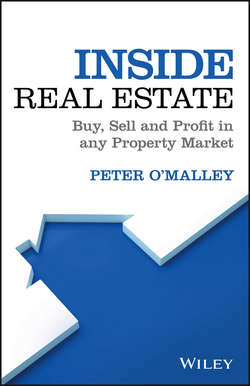Читать книгу Inside Real Estate - O'Malley Peter - Страница 6
На сайте Литреса книга снята с продажи.
INTRODUCTION
ОглавлениеIn poker there are two types of players: those who know the rules and those who can play the game. In the real estate market there are three kinds of participants: those who know the rules, those who can play the game and those who have no idea what they are doing. No matter which category you fit into, I hope Inside Real Estate will guide you toward a successful transaction.
The game is played differently according to market conditions. This is a subtle but vital factor that is often lost in mainstream commentary about the market. In 2013 I wrote Real Estate Uncovered to close the gap between consumers' poor experiences with the industry and most agents' objective of delivering a premium service. My goal with this new book is to teach consumers the keys to success in both rising and falling markets.
At the time of writing, the Australian property market is as diverse as the landscape it is built on. Perth is depressed; regional Western Australia is even worse. There are reports of properties in mining towns losing 80 per cent of their value. At the same time the Sydney and Melbourne housing markets are experiencing a boom of historic proportions.
During the mining boom, exactly the opposite occurred. Perth – and to a lesser extent, regional Queensland – flourished, while Sydney and Melbourne struggled against elevated interest rates that were used to contain the thriving national economy. The underlying message here is that both the economic cycle and market conditions play a vital role when transacting real estate. A lot of commentary simply looks to the recent past to predict what will happen in the near future. This is clearly a lazy and ill-advised forecasting model.
Because Brisbane boomed after Sydney and Melbourne in the early 2000s, everyone jumped to the conclusion that history would repeat itself. However, at the time of writing, the Brisbane market, particularly apartments, experienced nominal growth with interest rates at ultra-low levels. The city underperformed against less popular investment markets such as the Gold Coast and Hobart.
In a nutshell, the Hobart and Gold Coast markets have seen vibrant economic growth while Brisbane has struggled to transition away from overdependence on the mining sector. In mid 2016, research house Core Logic reported that one in six apartments were sold at a loss in Brisbane. Depending on your risk profile and purpose for buying, now is either the very best time or absolutely the worst time to buy an apartment in Brisbane.
Perhaps, as you read this book, some or all of these conditions have changed again. I hope you'll find plenty of valuable tips and insights here to help you respond appropriately whatever the environment.
As economies, cities and demographics evolve, so too do the challenges. The first baby boomers turned 70 years old in 2016. The next 10 years will see a massive transition of wealth, much of it in the real estate market. This will come at a time when digital disruption puts consumers in direct contact with one another without the express need for an estate agent.
Cashed-up baby boomers will compete with aspirational home buyers for real estate in desirable locations within our towns and cities. Baby boomers will also sell down their property investment holdings to fund retirement. These demographic and digital disruptions will change the complexion of the property market.
The digital revolution has already changed the nature of the real estate industry. For better or worse, the disruption is likely to continue, and agents will need to reassert their true value to the general public if they are to fend off this threat.
Airbnb has its sights set on real estate agents' rent rolls. Landlords will increasingly opt out of traditional management structures to chase Airbnb-style service and efficiency. Much of the traditional real estate industry survives on its rent rolls. If they don't innovate, some agents face extinction in the face of these changes.
Recently a client who is a savvy businessman mused that he felt like a novice every time he transacted real estate because of the speed of change in the market. The purpose of this book is to bring the consumer seeking insight and knowledge on the industry up to speed before they transact.
Consumers will learn for themselves many of the traps and tricks exposed in this book once they have completed their property transaction. Unfortunately, that may well be too late to avoid financial loss and heartache. When it comes to real estate, learning through personal experience is expensive and painful, and the knowledge gained is often largely redundant, given that most people make such transactions infrequently.
I hope Inside Real Estate becomes your trump card the next time you play in the property market.
Peter O'Malley
March 2017
